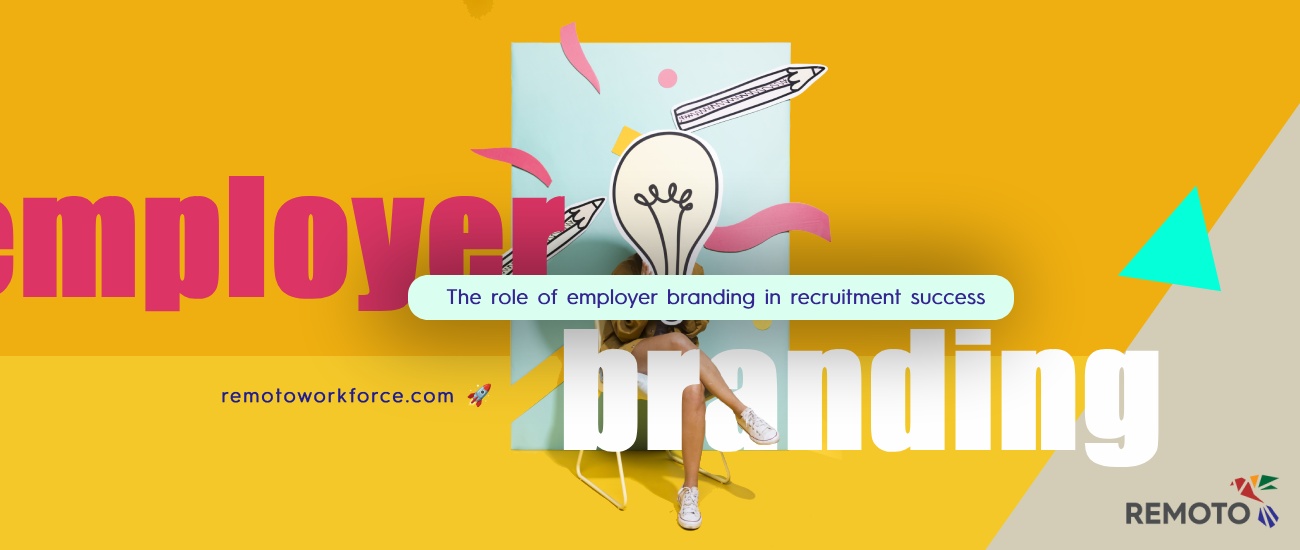Imagine you’re searching for a new job. You have two choices: one company is known for its lively culture and exciting growth opportunities, while the other is a little unknown. Which one would you choose? Most of the job seekers consider an employer’s brand before applying.
Employer branding is more than just a flashy logo or a catchy tagline. It’s the way your company looks and feels to potential employees. This includes everything from your mission statement to how you treat employees. In today’s competitive job market, a strong employer brand can be the difference between attracting top talent or being overlooked.
In this blog post, we’ll explore the vital role employer branding plays in recruitment success. We’ll address its definition, why it’s crucial, and how you can use it to attract and retain top talent.
Understanding Employer Branding: What It Is and Why It Matters
Employer branding is essentially the reputation your company holds as an employer. It’s how current and potential employees perceive your organization. This branding is shaped by various factors, including your company’s culture, work environment, and the values you promote.
Unlike company branding, which focuses on customer perception and market positioning, employer branding specifically targets potential and current employees.
Your employer brand encompasses several elements:
- Company culture: The everyday environment and values that define your workplace.
- Employee value proposition (EVP): The unique set of benefits and rewards offered to employees.
- Employee experience: How employees feel about their day-to-day work life and career growth.
While company branding is about how your business is perceived in the market, employer branding focuses on how your company is perceived as a place to work.
Employer branding has evolved from just offering perks like free snacks and flexible hours to a more profound focus on purpose and values. Historically, companies attracted talent through tangible benefits, but today’s job seekers are more interested in aligning with a company’s mission and values.
The Covid-19 pandemic and the Great Resignation have shifted priorities. Employees now value remote work options, work-life balance, and meaningful work more than ever. As a result, employer branding has had to adapt, emphasizing flexibility, mental health support, and a commitment to diversity and inclusion.
Why Employer Branding Matters for Recruitment
A robust employer brand acts like a magnet for top talent. When potential candidates see that your company is known for its positive culture, career growth opportunities, and commitment to work-life balance, they are more likely to apply.
In addition, employer branding impacts the candidate experience, from the initial job search to the final offer. A positive employer brand can make the application process smoother and more engaging. For example, if your brand is known for transparency and communication, candidates are more likely to have a positive experience throughout the recruitment process.
Positive employee reviews on platforms like Glassdoor and Indeed can boost your employer brand. Job candidates typically avoid companies with negative reviews. Encouraging your current employees to share their experiences and provide testimonials can improve your employer brand and attract top talent.
Components of a Strong Employer Brand
Your reputation as an employer is built on three pillars: career development opportunities, organizational culture, and corporate citizenship. Many companies are known for their commitment to helping employees grow and get involved in the community. This makes them more popular and attractive as employers.
Your EVP is also a crucial component of your employer brand. It should clearly articulate what employees can expect in terms of career growth, work environment, and rewards. A well-defined EVP aligns with your company culture and sets clear expectations for potential candidates.
Ensure that your EVP reflects your company’s culture and values. For instance, if your company values innovation and creativity, your EVP should highlight opportunities for employees to contribute to groundbreaking projects and develop new ideas.
To build a strong employer brand, you must deliver on the promises made in your EVP. This involves:
- Creating a positive work environment
- Offering competitive compensation and benefits
- Providing opportunities for career advancement
Building and Enhancing Your Employer Brand
A clear and compelling mission statement is vital for employer branding. It communicates your company’s values, goals, and purpose to potential candidates. A strong mission statement helps candidates understand what your company stands for and why it’s a great place to work.
Incorporate your mission statement into your employer branding strategy. Ensure that it is prominently featured on your career page, in job postings, and throughout your recruitment materials.
Your marketing team can help craft compelling employer brand content. Collaborate with them to develop messaging that resonates with your ideal candidate profile and reflects your company’s values.
In addition, advanced recruitment software like applicant tracking systems (ATS) can help maintain consistent employer branding. These tools enable you to create and distribute cohesive messaging across all channels.
Embrace the Power of Employer Branding
Employer branding plays a crucial role in recruitment success. A strong employer brand helps attract top talent, improve the candidate experience, and build a positive reputation. By focusing on key components such as reputation, proposition, and experience, you can enhance your employer brand and drive recruitment success.
Take the time to assess and enhance your employer branding strategy. Collaborate with your marketing team, leverage technology, and track your branding efforts to ensure you’re attracting and retaining the best talent. Start today and see the difference a strong employer brand can make in your recruitment efforts.














